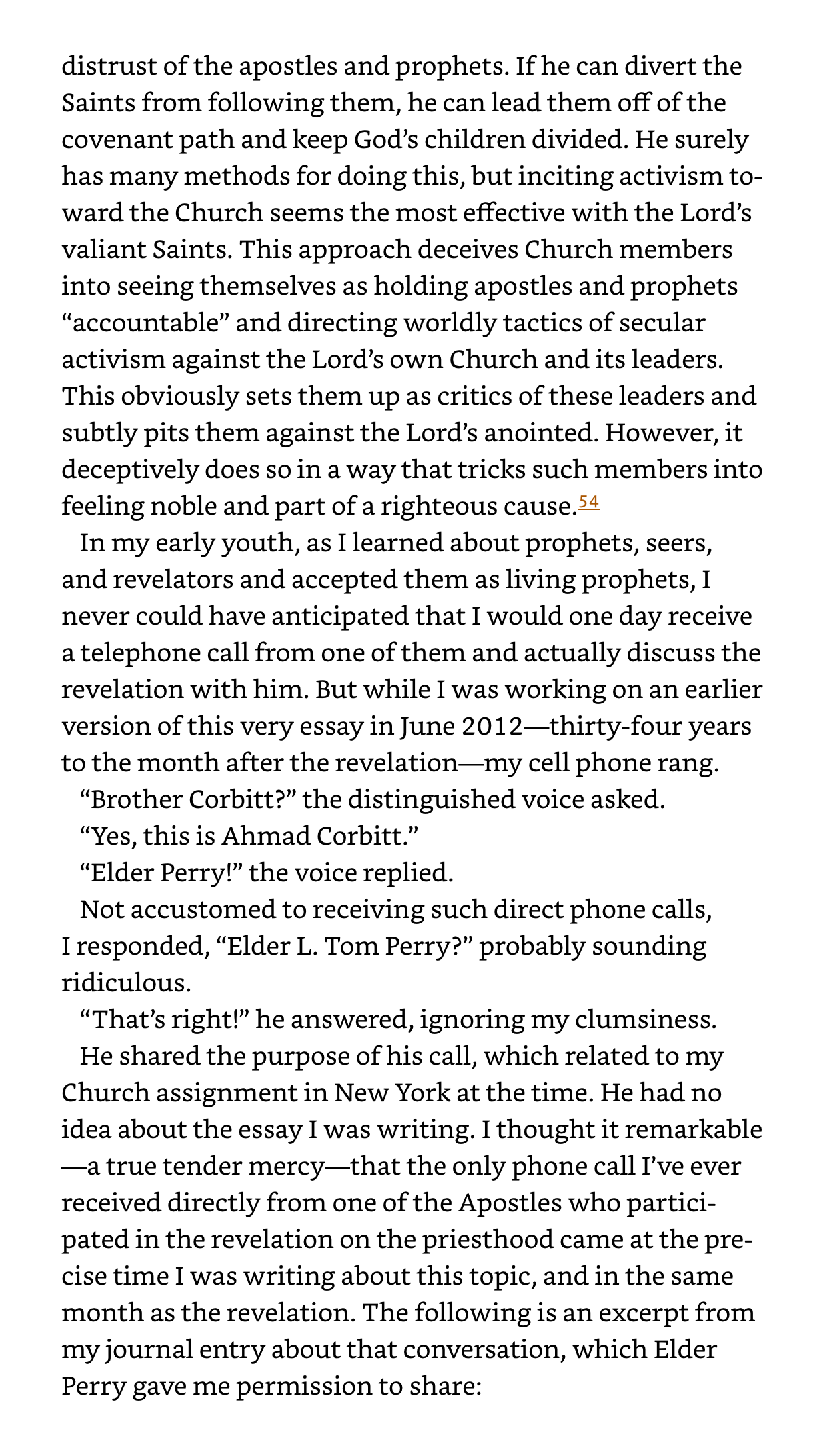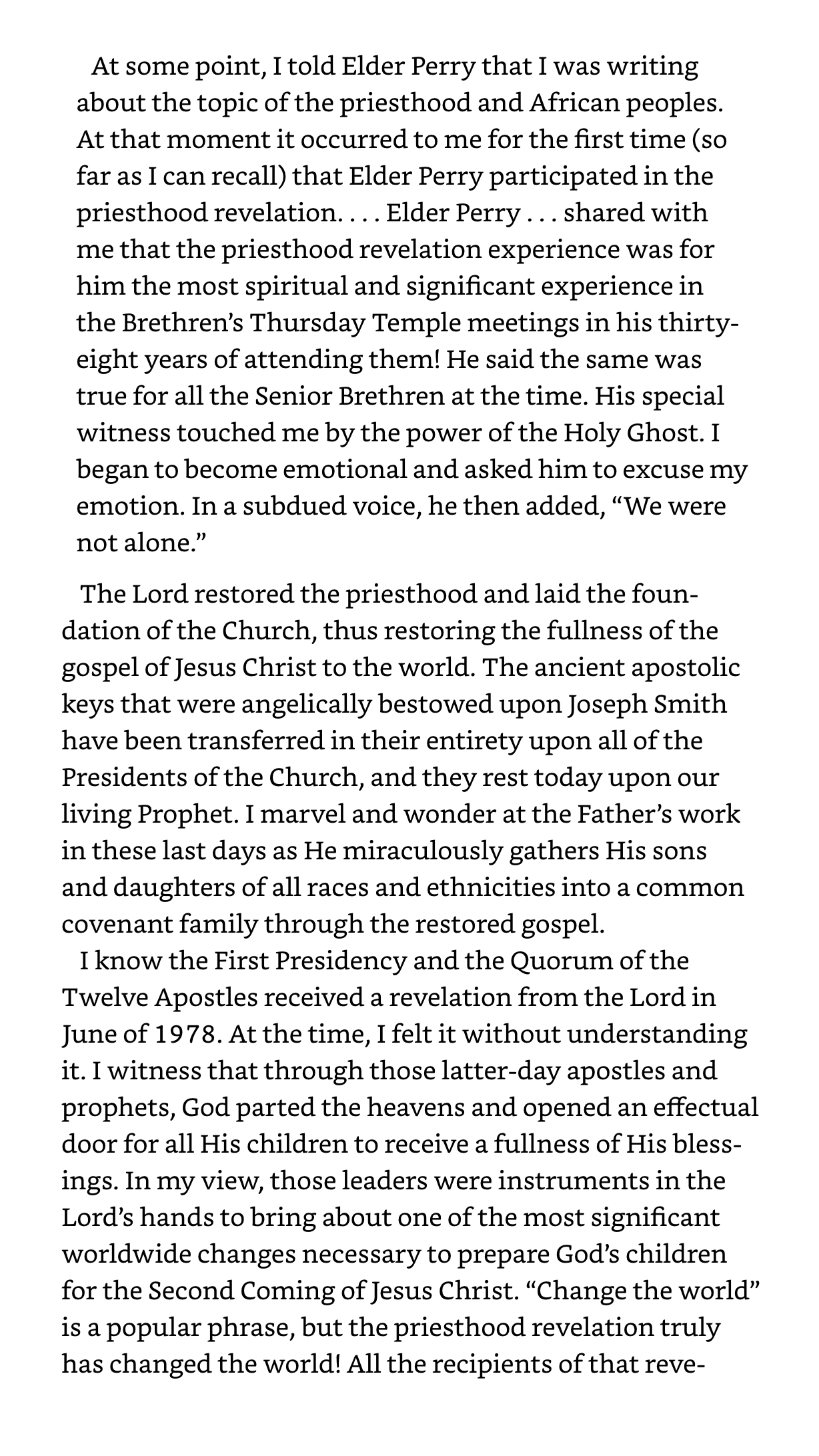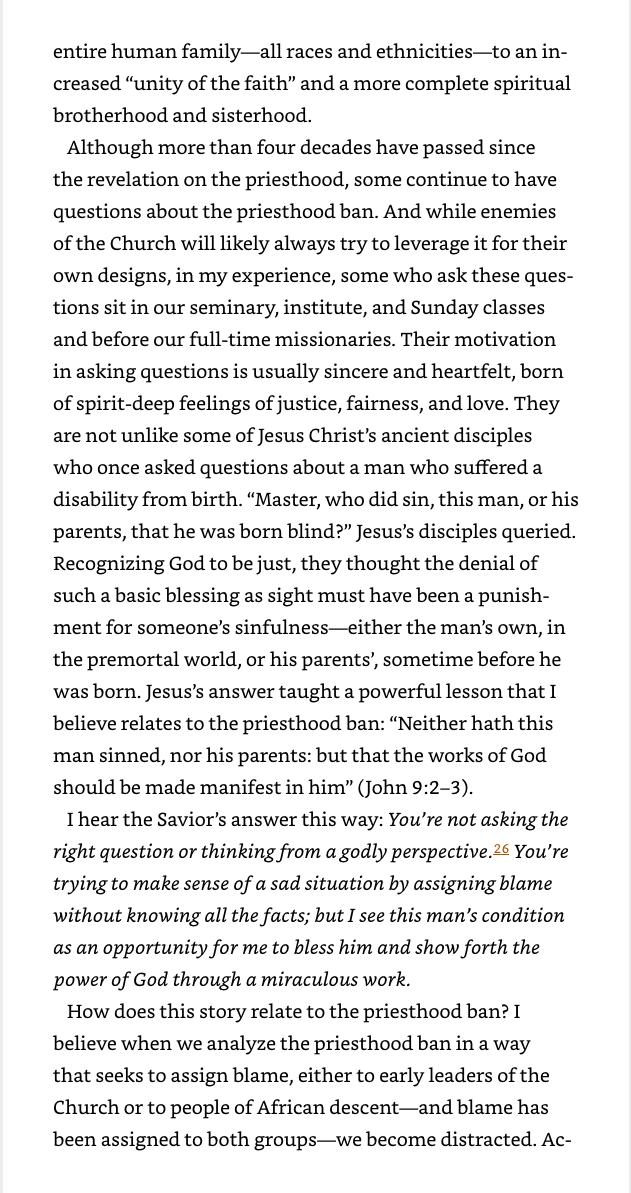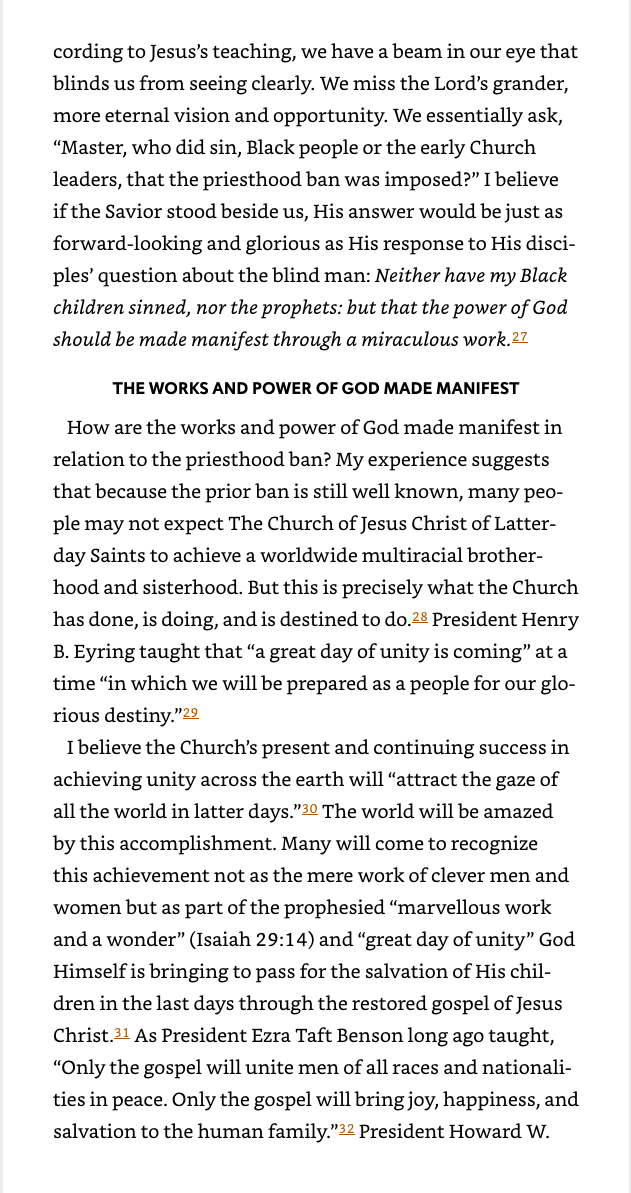Elder Ahmad S. Corbitt gives his perspective on the priesthood ban.
- Type
- Book
- Source
- Ahmad S. Corbitt LDS
- Hearsay
- Direct
- Reference
Ahmad S. Corbitt, The revelation that changed the world, In Tracy Y. Browning, Ahmad S. Corbitt, Edward Dube, and Carol Lawrence-Costley, Stay Thou Nearby: Reflections on the 1978 Revelation on the Priesthood (Salt Lake City, UT: Deseret Book Company, 2023), Kindle Edition
- Scribe/Publisher
- Deseret Book
- Audience
- General Public
- Transcription
Although more than four decades have passed since the revelation on the priesthood, some continue to have questions about the priesthood ban. And while enemies of the Church will likely always try to leverage it for their own designs, in my experience, some who ask these questions sit in our seminary, institute, and Sunday classes and before our full-time missionaries. Their motivation in asking questions is usually sincere and heartfelt, born of spirit-deep feelings of justice, fairness, and love. They are not unlike some of Jesus Christ’s ancient disciples who once asked questions about a man who suffered a disability from birth. “Master, who did sin, this man, or his parents, that he was born blind?” Jesus’s disciples queried. Recognizing God to be just, they thought the denial of such a basic blessing as sight must have been a punishment for someone’s sinfulness—either the man’s own, in the premortal world, or his parents’, sometime before he was born. Jesus’s answer taught a powerful lesson that I believe relates to the priesthood ban: “Neither hath this man sinned, nor his parents: but that the works of God should be made manifest in him” (John 9:2–3).
I hear the Savior’s answer this way: You’re not asking the right question or thinking from a godly perspective.26 You’re trying to make sense of a sad situation by assigning blame without knowing all the facts; but I see this man’s condition as an opportunity for me to bless him and show forth the power of God through a miraculous work.
How does this story relate to the priesthood ban? I believe when we analyze the priesthood ban in a way that seeks to assign blame, either to early leaders of the Church or to people of African descent—and blame has been assigned to both groups—we become distracted. According to Jesus’s teaching, we have a beam in our eye that blinds us from seeing clearly. We miss the Lord’s grander, more eternal vision and opportunity. We essentially ask, “Master, who did sin, Black people or the early Church leaders, that the priesthood ban was imposed?” I believe if the Savior stood beside us, His answer would be just as forward-looking and glorious as His response to His disciples’ question about the blind man: Neither have my Black children sinned, nor the prophets: but that the power of God should be made manifest through a miraculous work. . . .
In my early youth, as I learned about prophets, seers, and revelators and accepted them as living prophets, I never could have anticipated that I would one day receive a telephone call from one of them and actually discuss the revelation with him. But while I was working on an earlier version of this very essay in June 2012—thirty-four years to the month after the revelation—my cell phone rang.
“Brother Corbitt?” the distinguished voice asked.
"Yes, this is Ahmad Corbitt.”
“Elder Perry!” the voice replied.
Not accustomed to receiving such direct phone calls, I responded, “Elder L. Tom Perry?” probably sounding ridiculous.
“That’s right!” he answered, ignoring my clumsiness.
He shared the purpose of his call, which related to my Church assignment in New York at the time. He had no idea about the essay I was writing. I thought it remarkable—a true tender mercy—that the only phone call I’ve ever received directly from one of the Apostles who participated in the revelation on the priesthood came at the precise time I was writing about this topic, and in the same month as the revelation. The following is an excerpt from my journal entry about that conversation, which Elder Perry gave me permission to share:
At some point, I told Elder Perry that I was writing about the topic of the priesthood and African peoples. At that moment it occurred to me for the first time (so far as I can recall) that Elder Perry participated in the priesthood revelation. . . . Elder Perry . . . shared with me that the priesthood revelation experience was for him the most spiritual and significant experience in the Brethren’s Thursday Temple meetings in his thirty-eight years of attending them! He said the same was true for all the Senior Brethren at the time. His special witness touched me by the power of the Holy Ghost. I began to become emotional and asked him to excuse my emotion. In a subdued voice, he then added, “We were not alone.”
The Lord restored the priesthood and laid the foundation of the Church, thus restoring the fullness of the gospel of Jesus Christ to the world. The ancient apostolic keys that were angelically bestowed upon Joseph Smith have been transferred in their entirety upon all of the Presidents of the Church, and they rest today upon our living Prophet. I marvel and wonder at the Father’s work in these last days as He miraculously gathers His sons and daughters of all races and ethnicities into a common covenant family through the restored gospel.
I know the First Presidency and the Quorum of the Twelve Apostles received a revelation from the Lord in June of 1978. At the time, I felt it without understanding it. I witness that through those latter-day apostles and prophets, God parted the heavens and opened an effectual door for all His children to receive a fullness of His blessings. In my view, those leaders were instruments in the Lord’s hands to bring about one of the most significant worldwide changes necessary to prepare God’s children for the Second Coming of Jesus Christ.
The B. H. Roberts Foundation is not owned by, operated by, or affiliated with the Church of Jesus Christ of Latter-day Saints.




